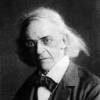Theodor Mommsen

Theodor Mommsen
Christian Matthias Theodor Mommsenwas a German classical scholar, historian, jurist, journalist, politician, archaeologist and writer generally regarded as one of the greatest classicists of the 19th century. His work regarding Roman history is still of fundamental importance for contemporary research. He received the Nobel Prize in Literature in 1902 for being "the greatest living master of the art of historical writing, with special reference to his monumental work, A History of Rome", after having been nominated by 18 members of...
NationalityGerman
ProfessionNon-Fiction Author
Date of Birth30 November 1817
CountryGermany
Sertorius was far from being strong enough to renew the gigantic enterprise of Hannibal. He was lost if he left Spain, where all his successes were bound up with the peculiarities of the country and the people; and even there, he was more and more compelled to renounce the offensive.
If, as the emperor Augustus says, from his time the coast of the ocean from Cadiz to the mouth of the Elbe obeyed the Romans, the obedience in this corner of it was far from voluntary and little to be trusted.
If it was in the interest of Rome to extend her conquests towards the East, and to enter on the inheritance of Alexander the Great there in all its extent, the circumstances were never more favourable for doing so than in the year 716.
The history of Rome presents various men of greater genius than Scipio Aemilianus, but none equalling him in moral purity, in the utter absence of political selfishness, in generous love of his country, and none, perhaps, to whom destiny has assigned a more tragic part.
The Mediterranean Sea with its various branches, penetrating far into the great Continent, forms the largest gulf of the ocean, and, alternately narrowed by islands or projections of the land and expanding to considerable breadth, at once separates and connects the three divisions of the Old World.
About the time of the expulsion of the Tarquins from Rome, the Etruscan power had reached its height.
For a whole generation after the battle of Pydna, the Roman state enjoyed a profound calm, scarcely varied by a ripple here and there on the surface.
In the Roman commonwealth, even on the conversion of the monarchy into a republic, the old was as far as possible retained.
Individual tribes or, in other words, races or stocks, are the constituent elements of the earliest history.
Marcus Crassus cannot, any more than Pompeius, be reckoned among the unconditional adherents of the oligarchy.
The ancient boundary of Italy on the north was not the Alps but the Apennines.
The battle of Varus is an enigma, not in a military but in a political point of view - not in its course, but in its consequences.
Under the Julian and Claudian emperors, the Parthians seem to have been the leading power at the mouth of the Indus.
An independent state does not pay too dear a price for its independence in accepting the sufferings of war when it cannot avoid them; a state which has lost its independence may find at least some compensation in the fact that its protector procures for it peace with its neighbours.